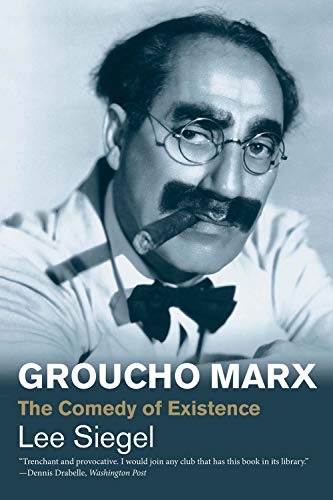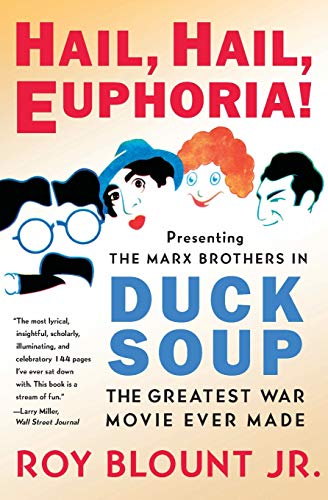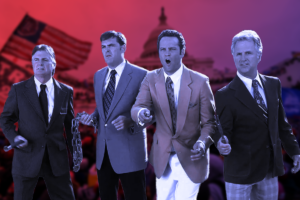Groucho: The Comedy of Existence
"Groucho and his brothers are outlaws, outcasts, and singular reproaches to society's injustices and hypocrisies with deep roots in Jewish forms of irony and dissent,” author Lee Siegel writes The famous dance sequence with Harpo leading a troupe of black children and adults, often dismissed as “another instance of Hollywood racism, is, on the contrary, as strong a statement of racial equality as you can find on the world of film”. Yale University Press
Yale University Press
“Groucho Marx: The Comedy of Existence” A book by Lee Siegel To see long excerpts from “Groucho Marx” at Google Books, click here.
“Hail, Hail, Euphoria! Presenting the Marx Brothers in Duck Soup, The Greatest War Movie Ever Made” A book by Roy Blount Jr. To see long excerpts from “Hail, Hail, Euphoria!” at Google Books, click here.
I’ve never subscribed to that silly saying, “Writing about music is like dancing about architecture.” But I do think that writing about the Marx Brothers is something akin to singing about herding cats. I admire those who take a stab at it and come out looking smart without seeming pretentious or pompous.
Lee Siegel, in his fast and stimulating little read, “Groucho Marx: The Comedy of Existence,” is at least half successful, which makes his book a rarity in Marx criticism.
Siegel plunges us into the hodgepodge of a cultural stew that Groucho and his brothers came out of: “The Marxes grew up at the turn of the twentieth century in Yorkville, a neighborhood on Manhattan’s Upper West Side that was teeming with European immigrants. … Groucho would have walked out into East 93rd Street, where the family settled, and heard a cacophony of German, Polish, and Russian as well as Spanish. … From the beginning, the Marx brothers experienced language as a fluid, shifting, arbitrary social phenomenon.”
The brothers’ “ ‘zany’ cinematic worlds were never much different from their material origins.” An early biographer quoted by Siegel described the family’s apartment, through which a swarm of colorful relatives and family friends passed through, as in a “bus station.” The same biographer wrote, “The door was never locked, there was a pot of coffee forever simmering on the stove, and the neighbors wandered in and out at random.” The brothers found their way into show business naturally. Mother Minnie Marx’s brother, Al, known as Al Shean, was one half of the well-known vaudeville team, Gallagher and Shean.
Leonard became Chico (pronounced “Chick-o”; from an early age he chased girls); he was “a pathological gambler and thief.” Adolf became Harpo, who liked to stroke the family’s harp, and Julius, “the unassuming and seemingly unremarkable middle child,” became you know who. Minnie, Siegel writes, “berated him for not having the looks or the charm of his brothers.” His mother, Groucho said, treated the brothers equally: “with contempt!”
Two other brothers, Milton and Herbert, are remembered, though not very well, as Gummo and Zeppo. (Though it should be noted that Zeppo was in five of their best films — not bad, considering that, as Siegel points out, “The Marx Brothers’ reputation really rests on seven films, made between 1929 and 1937: ‘The Cocoanuts,’ ‘Animal Crackers,’ ‘Monkey Business,’ ‘Horse Feathers,’ ‘Duck Soup,’ ‘A Night at the Opera,’ and ‘A Day at the Races.’ ” (I think Siegel underrates “At the Circus” and some large chunks of “The Big Store” and “A Night in Casablanca,” but let that pass.)
Siegel contends that much of Groucho’s persona was built on contempt. “His intellect and imagination were already stocked with the quintessential American language of self-improvement and social ascent that he had absorbed from Horatio Alger and the Frank Merriwell tales. Every syllable of this official vocabulary of American optimism was a little engine of social mobility and one more block in the building of character. Confronted with the need both to repel his mother’s verbal attacks and to find a language to impress her, he turned the language of positive American transformation on its head. … The important thing was first to attract attention. Then, having compelled people to notice him, he would proceed to hold their attention by refusing to make the slightest sense.”
This at least allows Siegel to make an entertaining case, and also a chance to reprise some of Groucho’s best lines:
In “The Cocoanuts”: “Think of the opportunities here in Florida! Three years ago I came to Florida without a nickel in my pocket. … Now I’ve got a nickel in my pocket.”
From “Monkey Business”: “I worked myself up from nothing to a state of extreme poverty.”
Groucho’s comedy, Siegel insists, is “The result of a condition, one that has deep roots in Jewish forms of irony and dissent.” I’m fine with that, and I agree that the famous dance sequence in “A Day at the Races” — “Who Dat Man?” with Harpo leading a troupe of black children and adults — which has often been dismissed as “another instance of Hollywood racism, is, on the contrary, as strong a statement of racial equality as you can find on the world of film.” Also, “the solidarity between Jews and blacks is the only note that’s struck.
“Groucho and his brothers are outlaws, outcasts, and singular reproaches to society’s injustices and hypocrisies. That makes them one with blacks.” Besides, who else was asking a chorus of black people to dance in their movies in 1937?
Where Siegel starts to jump the track is in his interpretation of Groucho’s famous reply to a Hollywood country club: “I do not want to belong to any club that will accept me as a member.” Not only do I disagree that it’s his most famous line — in the top 10 probably, but not in my top five, which would begin with “One morning I shot an elephant in my pajamas …” — but my jaw dropped when I read, “Whatever that almost mythic line really means, it is not funny.” Siegel is so wrong here, it makes me wonder why he would write this book. What Groucho’s famous line means to me is that we all aspire to being accepted at social levels that we secretly fear are above our stations and are ashamed of ourselves for aspiring to in the first place. If Siegel thinks the line isn’t funny, then he ought to repeat it in mixed company and gauge the reaction.Nor do I see it as “the epitome of self-loathing.” I think that, rather, it took guts for Groucho to say what many of us feel, and I thank him for saying it in a way that made us laugh and continues to do so.
Some of Siegel’s conclusions seem to come from another dimension where the Marx Brothers aren’t funny: “Groucho’s badinage, Chico’s non sequiturs, seemingly unwittingly puns, and malapropisms no longer work as comedy, if they ever did with any type of regularity.” Siegel would certainly be easy to spot in any revival house where a Marx Brothers movie was playing: He’d be the only one not laughing.
It’s hard to understand why Siegel writes, “To a great extent, the Marx Brothers were little bullies, fashioned in the image of big bullies” (referring to a line in “A Night at the Opera” where Groucho tells a prima donna tenor to stop hitting Harpo). Siegel is trying to read entirely too much into Groucho’s wisecracks. Pauline Kael was much closer to the mark when she wrote, the “Marx Brothers keep turning corners you didn’t know were there, and while you’re trying to break down the content of lines like Groucho’s ‘You big bully, why are you hitting that little bully?’ you miss the series of non sequiturs that are piling up on top of it.”
Roy Blount Jr. never missed a non sequitur in his life. Certainly not one from a Marx Brothers movie and most definitely not one from “Duck Soup,” which in 2009 was voted by an international panel of critics as the 37th greatest film of all time — which seems a bit low to me if by greatest you mean movies you can watch over and over. (“Ivan The Terrible, Part I” finished ahead of “Duck Soup” on that list, and I don’t believe anyone who says that they’ve started to watch it a second time.)
“Duck Soup” is also, as Blount notes in his 2010 book, “Hail, Hail, Euphoria!,” “The movie that makes the Woody Allen character Mickey in ‘Hannah and Her Sisters’ decide not to shoot himself.” (Mickey goes to see “Duck Soup” when he can’t think of a reason to go on living and is so distracted he decides to give life at least one more day.) Blount doesn’t cut Allen much slack for this: “For some reason, Mickey has been hung up on the question, if there was no God or afterlife, why is this life worth living? To me that is like asking: why eat lunch if there’s nothing for dinner?” Blount constantly reminds us that when you write about great humorists, it helps to be in their league, wit-wise.
“Duck Soup,” he writes, “is a seamless blend of just about every form of American comedy up to its time. Never had the whole history of American comedy been brought up to such a head, and never would it be again.”
The film was directed by Leo McCarey, whose camera technique was, according to screenwriter and director Nunnally Johnson, “to tell the actors ‘If you want to be in the movie, get in front of it.’ ” Blount gives McCarey his due; despite a couple of horrendous movies near the end of McCarey’s career, “his best comedies are finer than [Frank] Capra’s.” I would interject here and mention “The Milky Way” with Harold Lloyd and the Cary Grant-Irene Dunne screwball comedy, “The Awful Truth.”
McCarey, though he hated working with the Marxes, “was the only inspired director they ever worked with.” However inspired, “Duck Soup,” released in 1933, didn’t make much money, “partly because there wasn’t much money in 1933, but also because ‘Duck Soup’ didn’t mirror the national mood.” The plot is so nonsensical it could have come out of newspaper headlines: The mythical republic of Freedonia, under the deranged leadership of its new president, Rufus T. Firefly (Groucho, of course), is about to go to war with its neighbor, Sylvania, because Firefly slaps their foreign minister, Trentino (smoothly played by Louis Calhern), for calling him “an upstart.”
“Duck Soup” may not mirror the national mood today, but “it mirrors something more primal. Something heedless and ruthless as kids playing war.” Francois Truffaut called “Duck Soup” the only valid antiwar movie ever made. But, Blount points out, “our heroes bring on the war — the bad guy tries to avert it. They enjoy the war. And they win the war. Only then do they seem to be turning against it. But there is no indication that they wouldn’t happily start another war tomorrow.”
Who wouldn’t enjoy a war with the Marx Brothers leading the entire senate or parliament or whatever in a rousing chorus of “All God’s Chillun’ Got Guns”?
I would add only that in the great tradition of nihilism, after the Marxes start the war, they turn against it. They turn and throw fruit at the former first lady, Mrs. Teasdale (Margaret Dumont), as she sings the national anthem, “Hail, Hail, Freedonia, Laaaand of the Braaave …”
“Are they throwing food at Mom?” Blount asks rhetorically, “a mother who, in the Marxes’ case, deprived them of a normal childhood by pushing them onto the stage? Nah. Where would they have found a normal childhood at the time and in the place where they grew up? And what would they have done with a normal childhood? Less, surely, than what they did with the childhood they had.”
Hail, hail!
Your support matters…Independent journalism is under threat and overshadowed by heavily funded mainstream media.
You can help level the playing field. Become a member.
Your tax-deductible contribution keeps us digging beneath the headlines to give you thought-provoking, investigative reporting and analysis that unearths what's really happening- without compromise.
Give today to support our courageous, independent journalists.








You need to be a supporter to comment.
There are currently no responses to this article.
Be the first to respond.